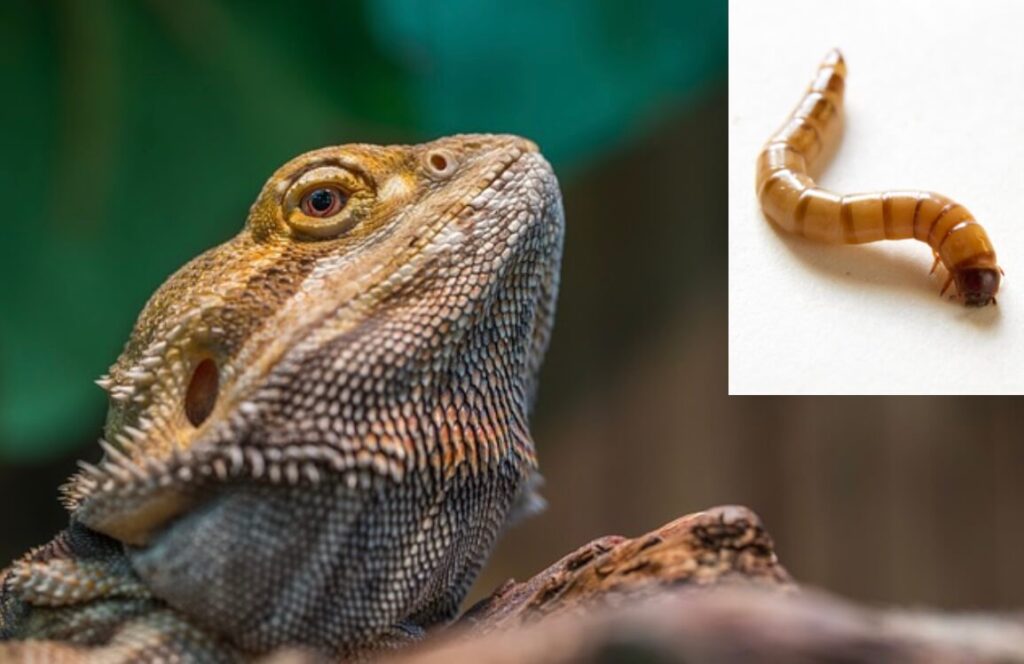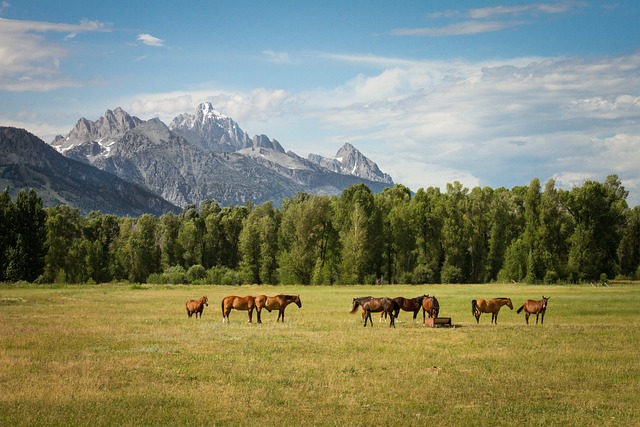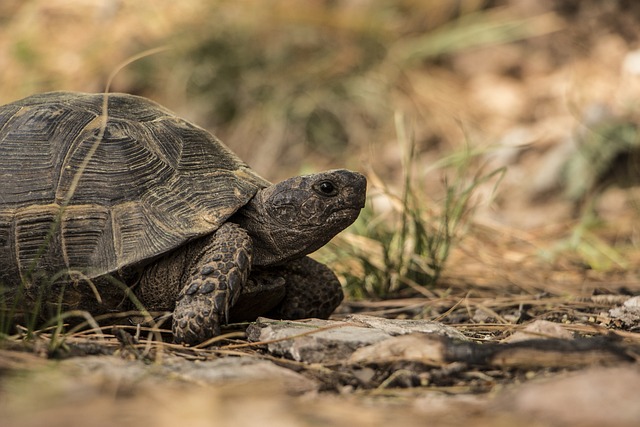If you’re wondering “Can bearded dragons eat wax mealworms?,” the answer is a qualified yes. Bearded dragons can eat mealworms because they’re high in protein. However, they should be eaten in moderation because they’re also high in fat.
Mealworms are easy to get at most pet stores and commonly used as reptile feed, all over the world. They are often also used as fishing bait.
In this article, we’ll explore the nutritional value of mealworms for bearded dragons and how to feed them properly. As well, see our full guide on feeding beardies worms here – Can bearded dragons eat worms?
Can bearded dragons eat mealworms?
- Can bearded dragons eat mealworms?
- Mealworm Nutritional Value for Bearded Dragons:
- How often should you give mealworms to your beardie?
- Should I feed my baby bearded dragon superworms?
- Potential risks associated with feeding mealworms to your bearded dragon:
- What to do if your bearded dragon eats pesticide covered mealworms accidentally?
- Frequently Asked Questions (FAQ): Can bearded dragons eat mealworms?
- Can bearded dragons eat mealworm pupa?
- How many mealworms to feed a baby bearded dragon?
- How many mealworms should a juvenile bearded dragon eat a day?
- Are mealworms or crickets better for bearded dragons?
- Can reptiles eat dried mealworms?
- Should you wet dried mealworms?
- Do dried mealworms need to be refrigerated?
- What bugs can bearded dragons not eat?
- Can Beardies eat scrambled eggs?
- Foods bearded dragons can eat:
- Getting your bearded dragon calcium:
- Vegetables to feed your bearded dragon:
- Insects to feed your bearded dragon:
- How often should you feed a bearded dragon?
- What should a bearded dragon not eat?
- Recap: Can bearded dragons have mealworms?
Mealworm Nutritional Value for Bearded Dragons:
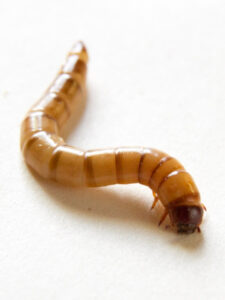
Mealworms are the caterpillar form of the yellow mealworm beetle, which is a type of darkling beetle. They provide nutritional value to bearded dragons because they have protein, which your pet needs to grow and sustain their bone health. They also contain high levels of vitamins, Magnesium, Iron, phosphorus, and importantly – calcium. Calcium is vital for a bearded dragon’s health.
A note on phosphorus: In bearded dragons, it’s important to always be aware of the phosphorus and calcium content in food you feed them. Why? Bearded dragons need a good amount of calcium to grow and to maintain bone and muscle health in adulthood. However, phosphorus inhibits the absorption of calcium if there’s too much of it, relative to the calcium amount.
You should aim for a 2:1 ratio of 2 parts calcium to 1 part phosphorus. Unfortunately, mealworms have far more phosphorus than calcium, so feeding them this worm regularly will seriously inhibit their calcium absorption. We’ve outlined ways to increase your beardie’s calcium intake below.
How often should you give mealworms to your beardie?
You can feed your bearded dragon mealworms every few days. Better yet, you should aim to give it to them every week or two, as a special treat. Although your beardie might love the taste of mealworms, they are too high in fat and phosphorus to be a regular addition to their diets.
Should I feed my baby bearded dragon superworms?
No, the hard exoskeleton of superworms can be hard for baby bearded dragons to digest properly. They’re still growing and need a lot of high calcium foods to grow properly. Consider Dubia roaches, crickets, and silk worms instead.
Potential risks associated with feeding mealworms to your bearded dragon:
Giving your beardie a food source with a lot of phosphorus always poses a risk. You can sprinkle calcium powder on mealworms to increase their calcium content. However, if you were to only give your pet phosphorus rich foods, they would eventually develop brittle bones and it could even lead to paralysis. That’s why we recommend you treat this particular worm more as a treat rather than a staple in their diet.
Mealworms are also quite high in fat, and if your beardie overeats on them, they run the risk of gaining weight. Bearded dragons are already prone to obesity, especially since they’re likely in a terrarium all day and not roaming in the wild.
What to do if your bearded dragon eats pesticide covered mealworms accidentally?
Don’t panic. If you catch your bearded dragon eating mealworms that you suspect have pesticides on them or are carrying parasites, Immediately stop them from eating the worms, and closely monitor them closely for symptoms of a strong reaction. This reaction could include:
- Bloating
- Diarrhea
- Vomiting
- Spitting up
- Abnormal behaviors
Give them lots of water to flush out the chemicals as well as a warm bath to calm them down and to encourage a bowel movement. If the reaction worsens or you’re noticing anything out of the ordinary, call a vet immediately.
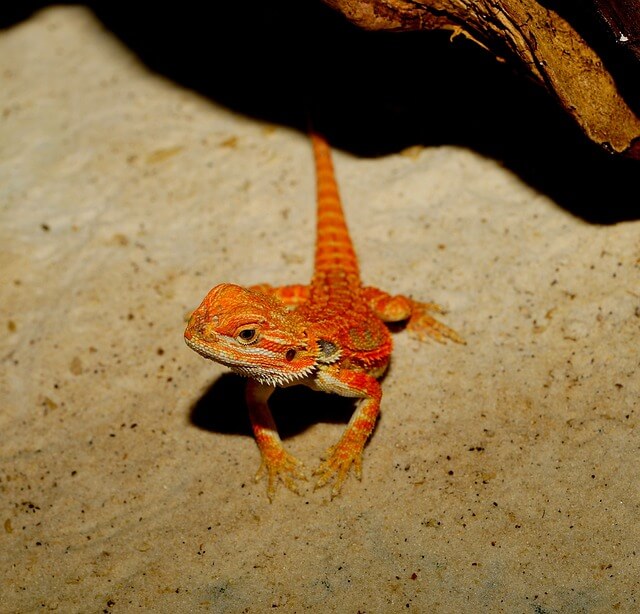
Frequently Asked Questions (FAQ): Can bearded dragons eat mealworms?
Can bearded dragons eat mealworm pupa?
Yes, bearded dragons can eat mealworms, both in their pupa form and their larva form.
How many mealworms to feed a baby bearded dragon?
Try to feed your baby bearded dragon smaller, younger mealworms as the larger ones might impact their stomach. Give baby bearded dragons one to three mealworms every few days at most.
How many mealworms should a juvenile bearded dragon eat a day?
Juvenile bearded dragons can eat more mealworms as they grow stronger – you can give them three to five mealworms at once and see how they like them. Feed them more if they finish all their mealworms immediately as they’re growing at this stage and need a lot of protein to properly develop.
Are mealworms or crickets better for bearded dragons?
In general, crickets have more fiber than worms,and they also have a better calcium to phosphorus ratio. You should feed your bearded dragon crickets daily, and worms on occasion.
Can reptiles eat dried mealworms?
Yes, dried mealworms provide a great source of protein for reptiles. However, live worms always carry more nutrients and hydration, although they don’t last as long. As well, feeding live insects and worms to your bearded dragons helps keep their senses sharp and is just more enjoyable for them overall.
Should you wet dried mealworms?
It isn’t necessary to wet dried mealworms, but if you do, it provides more hydration to your bearded dragon. Go ahead and wet your mealworms if you’re noticing your dragon not drinking enough water.
Do dried mealworms need to be refrigerated?
No! Dried mealworms can last over a year without being refrigerated. They just need to be in an airtight container in a cool space, like a cupboard.
What bugs can bearded dragons not eat?
Avoid feeding your bearded dragon these bugs:
- Any bug that glows, especially fireflies
- Lightning bugs
- Poisonous ants like red ants
- Ladybugs
Can Beardies eat scrambled eggs?
Yes, beardies can safely eat scrambled eggs. Remember not to mix in any additional ingredients that they can’t eat, and not to feed them more than roughly half an egg at a time.
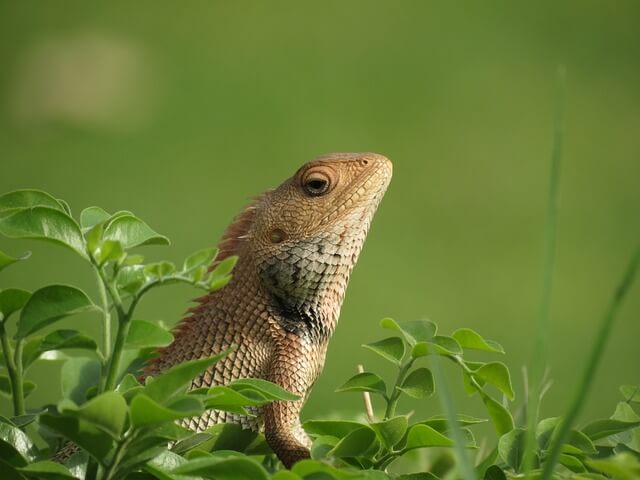
Foods bearded dragons can eat:
If you’re wondering what you should feed a bearded dragon, read our guidelines below. Bearded dragons are insectivores, which just means they thrive on insects as well as plant materials.
If you have a juvenile bearded dragon (between six and eighteen months old), give them about 80% vegetables and 20% live insects.
As your bearded dragon transitions into adulthood, give them the inverse, so 20% plant materials and 80% insects.
Getting your bearded dragon calcium:
Calcium is especially vital to a bearded dragon, especially a young one that is still growing. There are several ways to introduce more calcium into your beardie’s diet:
- Add in more high calcium vegetables like dandelions, bok choy, and collard greens.
- Dust calcium powder over their insects and vegetables to increase calcium levels.
- Make sure they’re getting their 12 hours of UVB exposure as they need this light to be able to properly absorb nutrients.
Vegetables to feed your bearded dragon:
- Peas
- Dandelion
- Green beans
- Cabbage
- Zucchini
- Pumpkin
- See our full list of vegetables to feed your bearded dragon
Note: Bearded dragons can also eat fruit in moderation. See here for a complete list of fruits bearded dragons can eat.
Insects to feed your bearded dragon:
- Crickets
- Kingworms
- Waxworms
- See our full guides to insects you can feed your bearded dragon and worms to feed your bearded dragon
Quick note: Live insects raised by you or bought from the pet store are best because they’re definitely pesticide free.
How often should you feed a bearded dragon?
During the first 3-6 months of your beardie’s life, try to feed them four to five times a day by giving them as many insects as they’d like in 10 minutes. They’re growing and need lots of protein during this stage.
Reduce the number of feedings to about two to three times a day when they’re growing into their juvenile years (between six and eighteen months).
As they become an adult, you can feed them once daily.
What should a bearded dragon not eat?
Avoid feeding your bearded dragon:
- Onions
- Leeks
- Chives
- Mushrooms
- Garlic
- Acidic fruit like oranges, lemons
- Rhubarb (can be toxic to them)
- Avocados (surprisingly, these make them ill)
- Eggplant
- Insects caught in the wild (there may be pesticides covering them)
- Venomous insects
- Dairy of any kind
- Rice and grains of any kind
- Frogs or toads
- Ham or other processed meats
Recap: Can bearded dragons have mealworms?
- Yes, bearded dragons can eat mealworms. They are full of protein and calcium which are great for beardies.
- However, try not to feed them mealworms daily as they also contain a large amount of fat, and can cause obesity in your dragon if fed to them too much.
For our full list of food to feed a bearded dragon, see our guide here.
Related articles:

